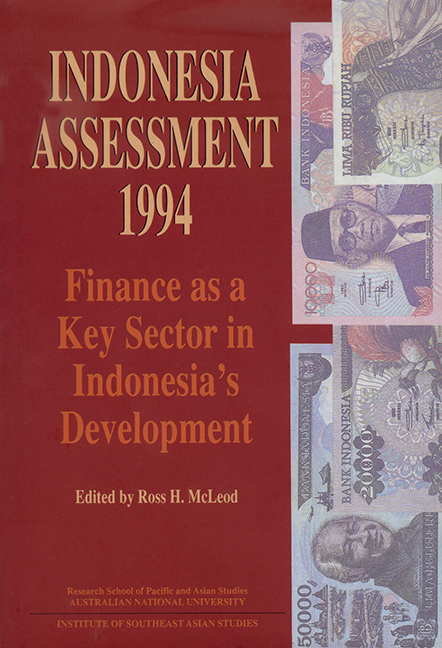Book contents
- Frontmatter
- Contents
- Tables, figures, appendices
- Foreword
- Glossary
- Contributors
- Acknowledgements
- 1 Introduction
- PART A ECONOMIC AND POLITICAL DEVELOPMENTS
- PART B FINANCE AS A KEY SECTOR IN INDONESIA'S DEVELOPMENT
- I The Reform Process
- II Monetary and Exchange Rate Policy
- III Banking Sector Reforms
- IV Domestic and International Capital Markets
- 12 The role of the Indonesian capital market
- 13 Indonesian capital market development and privatisation
- 14 Problems and prospects for the life insurance and pensions sector in Indonesia
- 15 Indonesia's foreign debt
- V Small-scale Finance
- References
- Index
14 - Problems and prospects for the life insurance and pensions sector in Indonesia
from IV - Domestic and International Capital Markets
Published online by Cambridge University Press: 21 October 2015
- Frontmatter
- Contents
- Tables, figures, appendices
- Foreword
- Glossary
- Contributors
- Acknowledgements
- 1 Introduction
- PART A ECONOMIC AND POLITICAL DEVELOPMENTS
- PART B FINANCE AS A KEY SECTOR IN INDONESIA'S DEVELOPMENT
- I The Reform Process
- II Monetary and Exchange Rate Policy
- III Banking Sector Reforms
- IV Domestic and International Capital Markets
- 12 The role of the Indonesian capital market
- 13 Indonesian capital market development and privatisation
- 14 Problems and prospects for the life insurance and pensions sector in Indonesia
- 15 Indonesia's foreign debt
- V Small-scale Finance
- References
- Index
Summary
Introduction
Life insurance and pension funds represent the major vehicles for long-term savings in most developed economies. Life insurance originally grew out of the need for individuals to provide their dependants with a level of financial security in case of their premature death. However, with declining mortality rates and the advent of retirement from the paid labour force, life insurance policies largely have become long-term savings contracts. In essence, these policies now provide benefits which focus on retirement rather than death.
Employer-based pension funds appeared in the nineteenth century in the UK and the US to provide employers with a mechanism for retiring older staff as they became less productive. As the pension industry developed world-wide, it was natural for life insurance companies—with their closely related skills and experience in long-term individual life insurance policies—to offer a range of pension products. Indeed, for many life insurance companies, group pension business has now become much more important than the original life business.
From the macroeconomic point of view, life insurance and pension funds are of great interest because of their ability to generate long- term savings, which then become available for financing similarly long-term investment projects. Financial policy-makers are well aware of the potential contribution to economic growth of this sector, but they are also conscious of the risk to life insurance policy holders and pension fund members that their savings will be dissipated rather than built up over the years by those to whom they are entrusted, whether as the result of deliberate intention or poor management. The objective, therefore, is to create a policy regime and a regulatory environment which will encourage these forms of saving, while at the same time provide a high level of protection for individuals’ savings.
With these purposes in mind, the Indonesian government introduced new life insurance and pensions legislation in 1992 (Government of Indonesia 1992a, 1992d).
- Type
- Chapter
- Information
- Indonesia Assessment 1994Finance as a Key Sector in Indonesia's Development, pp. 248 - 267Publisher: ISEAS–Yusof Ishak InstitutePrint publication year: 1994

